Four candidates attended Wednesday night’s Tiger Bay Club forum at the Palm Coast Community Center: David Alfin, Carol “Mother Elizabeth” Bacha, Doug Courtney, and Cornelia Downing Manfre. Not in attendance were Alan Lowe and Kathy Austrino. The event was held by the nonpartisan Tiger Bay club and moderated by a member of its Board of Directors, Teldra Jones. The panelists comprised of local business, faith, and political leaders: Scott Campion (president of the European Village Business Association), Lovie Haley (Matanzas High School honor student), Alex Soares (young professional), and pastors Andrew Hale and Charles Solano. Ten rounds of questions were asked covering a variety of topics, and each of the four candidates were given the chance to answer each one. The Q&A session was broadcasted live on WNZF as well as the Tiger Bay Club‘s social media.
Diversity in City Government
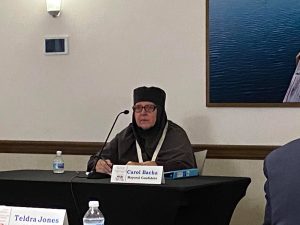
Republican candidate Carol “Mother Elizabeth” Bacha. ⓒ AskFlagler
The first question of the evening addressed diversity in the city government. The candidates were asked if they were aware of any effort made by Palm Coast to promote diversity, equality, and inclusion within their city staff.
David Alfin, up first on this question, stated “I believe the role of the Mayor is to serve all of the public. All groups, all residents, all interests.” He stated that enough can never truly be done, but that he’d be attentive to all residents as Mayor.
Carol Bacha agreed: “This is an ongoing priority”. She stated her intention to follow existing laws on the books about the issue, but didn’t promote herself as an expert on the subject.
Doug Courtney was not aware of any existing efforts by Palm Coast to uphold diversity, but expressed dissatisfaction that only recently did Palm Coast and Flagler County appoint their first women City Manager and County Administrators, respectively. He recounted seeing next to no racial minorities in a visit to City Hall.
Cornelia Manfre highlighted the diversity in the Flagler School District, comparatively high when held against the City of Palm Coast. She related working with a company based in Manchester that acknowledged to her Palm Coast’s diversity as a city.
Civility in the City Council
The second question of the evening brought up recent incivility and grandstanding in Palm Coast City Council meetings. Such gatherings have seen name-calling and individual attacks over the last seven months or so, which begged the question: what would each candidate do as Mayor to bring collaboration back to City Hall?
Carol Bacha was up first this time, and she expressed a desire to bring more people into the processes of city government. She recounted experience leading a volunteer program at Mercy Hospital in Miami, and floated creating a trained volunteer core and hands-on feedback in every department.
Doug Courtney certainly agreed with the assessment that the Council had grown dysfunctional, calling the chambers a room full of alpha males. “Opposition, contention is good for the city,” Courtney said.
Cornelia Manfre cited her own experience as a mediator and negotiator, but acknowledged that “there are always going to be problems”.
David Alfin likened the situation to teams he’d dealt with as a former soccer referee. “Collaboration, working toward consensus, to earn community confidence is the mandate of each member of the City Council,” said Alfin, before calling the Council “broken”.
Elected City Manager
Third up was the lengthiest question asked, one that asked candidates if the town’s growth made them consider switching form a Council-Manager form of government to a Mayor-Council form, or a hybrid of the two. Also posed was whether to make the City Manager, currently appointed by the City Council, into an elected official with Council oversight and budget approvals.
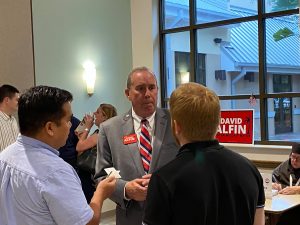
Republican candidate David Alfin speaks with voters prior to the forum. ⓒ AskFlagler
Bacha, again first up, felt that such a change should be up to the citizens. She recounted her experience as a licensed nurse, and having to work with different government agencies during Hurricane David in 1979. Also of note from Bacha: lack of diverse channels had caused the Challenger disaster in 1986.
Courtney didn’t want to commit to any sort of government change, feeling too many questions and variables were present. He was also critical of the idea that a City Manager could be elected without the same vetting that the Council applies in the current system.
Manfre thought the proposal was interesting, but ultimately agreed with Courtney: that scrutiny of a potential Manager’s credentials was an important part of the process, and would not be guaranteed in a democratic election.
Alfin cited that only two Florida cities have a strong-mayor government (it’s actually the top six most populous as well as a few others), and that both were of much higher populations than Palm Coast (most strong-mayor cities are). His stance: fix the City Council and return it to a greater effectiveness seen at times in the city’s 22 years of incorporation.
Seniors and Youth
The next question asked candidates to weigh out how they’d balance Palm Coast’s senior population with its ability to be a city that attracts young professionals.
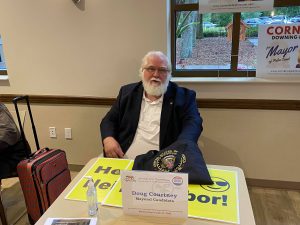
Democratic candidate Doug Courtney speaks to voters prior to the forum. ⓒ AskFlagler
Courtney asserted that at its inception, Palm Coast was designed as a retirement center. He said a true balance would be difficult, and that he’d like to address the diversity of age by increasing efforts to remedy mental health issues in the city (more on that topic later).
Brought up by Manfre was a theme she touched on more than once: examining and collaborating with other cities. She advocated for seeing what neighboring cities offer, and that Palm Coast ought to offer a beacon of opportunity for those seeking jobs. Asked what obstacles there are for Palm Coast to offer more jobs now, Manfre answered that a Mayor ought to be able to act as an ambassador, meeting CEOs who might want to bring in their businesses.
Alfin referenced his daughter having graduated from the University of Central Florida and choosing to return to Palm Coast to begin her career. “I think the idea of Palm Coast being a retirement community is past its day,” Alfin spoke.
Bacha stood up from her chair for this question, and spoke so the whole, cavernous room could hear her. “We all have to work and come out of this pandemic singing,” she said, playing off of her experience as a conductor. She recounted her unsuccessful run for Flagler School Board last year against Colleen Conklin, and wish she’d gotten the chance then to demonstrate what she had to offer.
It was around then that a group of demonstrators stood outside the windows of the room, waving for Mayor signs a dozen or so yards away. Several noticed Lowe faithful, and after a few minutes they left the area.
Mental Health
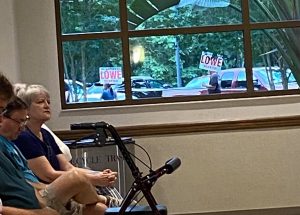
There were four Lowe supporters waving signs for a few minutes outside the Palm Coast Community Center. ⓒ AskFlagler
The fifth question was simple: how would each candidate enhance mental health services in Palm Coast?
Manfre again spoke to collaboration, aimed at providing counsel to mentally ill homeless, and to work with the Flagler County Health Department to do so.
Alfin referenced his experience as president of the Flagler County Education Foundation, and posed that mental health concerns should start with the city’s youth. Furthermore, Alfin wanted to work with the different hospitals of Palm Coast: “We have enjoyed the services of our local hospital community for many years.” He said he’d ask hospitals if there was more they could dedicate to the issue. Asked then if hospitals were the only aspect of his approach, Alfin added religious organizations as a player, given their ability to identify those in need of services.
For Carol Bacha’s answer, the question was read by panelist Alex Soares, who stated the issue had a particular meaning to him personally. Bacha asked if he’d expand upon that connection, and in a few words, Soares described a family of immigrants who didn’t enjoy opening up. Bacha offered sympathy to Soares, and framed her response with a clever analogy: she’d recently visited the hospital, and saw a collection of balloons for a sick child. The city’s upcoming MedNex project, Bacha hoped, would not be full of a similar hot air in how it addressed the mental health crisis.
Before answering the question, Courtney took a moment to acknowledge the broad spectrum of ailments that mental health can include, ranging from Alzheimer’s and dementia to PTSD from the battlefield. He said he didn’t know of any Palm Coast government department that handled the problem, and floated the idea of creating one that did.
Parks and Recreation
The sixth question on the night asked candidate what they thought about potentially forming a Parks and Recreation planning board for the City of Palm Coast.
David Alfin, the first to field the question, was receptive to the idea. He brought up the city’s array of parks and amenities, and put forth that keeping recreation strong is what makes Palm Coast a popular place to live.
Carol Bacha proposed having representatives from nonprofits, and seeking funds for such a board from localized gifts and endowments.
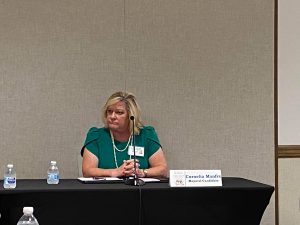
Democratic candidate Cornelia Downing Manfre. ⓒ AskFlagler
Doug Courtney agreed the board was a good idea, and that it should be looked at. He echoed Bacha’s proposal of having nonprofit representation, and added that a City Council member should be included as well. He spitballed a seven-person board as a potentially fitting size.
For Cornelia Manfre, looking at how other communities handled the idea was again something she’d want to do. She reiterated keeping taxes down for residents even with a project like this, and pointed out that new parks and rec projects would require the city to expend capital. Manfre also floated the idea of an olympic-sized swimming pool in Palm Coast, recalling a local athlete in the recent Olympic trials who’d not had such a facility in Palm Coast growing up.
Challenges for the Council
The seventh candidate question came in three parts: what are the City Council’s greatest challenges in the short term, what is the candidate’s vision in the long term, and what have they done to improve the community as they’ve lived in Palm Coast?
First up this time, Courtney answered that the Council’s greatest challenges are hiring a new City Manager and working out the city budget. For the long term, he expressed desire to better address senior citizens in Palm Coast. And for his own service to the community, he recounted his experience as the first City Clerk in Palm Coast, working in its first administration.
Cornelia Manfre expressed her desire “to position the City Manager, whether it’s someone from within or the outside.” In her elaboration, Manfre suggested finding a Manager with experience in a larger city (prior C.M. Matt Morton worked in several Washington cities before Palm Coast). For her long term goals, Manfre named the budget, infrastructure, and the city’s swale system as her priorities.
David Alfin considered the biggest challenge for the Council to be uniting it. He recited his “three C’s” plan that’s been a frequent part of his campaign: collaboration, consensus, and confidence. His most proud community investment was expanding a 20 scholarship program he oversaw to one that distributed over 140 scholarships this past year.
For Carol Bacha, she recounted experiences she’d had working in Maitland, Winter Park, and Orlando, hoping to see similar providence over Palm Coast in her mayorship. Between this and the next question, Bacha stood up and invited the room to take a stretch, having now sat down for over an hour.
Handling the Budget
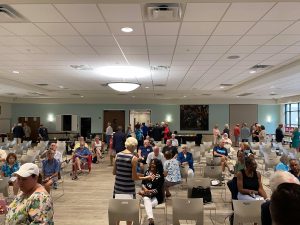
Turnout was high at the Palm Coast Community Center Wednesday. ⓒ AskFlagler
Winding down to the final three questions of the forum, the next topic was the budget. Candidates were asked about the largest budget they’d yet handled, and how they’d preside over Palm Coast’s as Mayor.
Carol Bacha was well-equipped for the question, recalling a time as a nurse in Brevard she’d helped procure over $3 million in medical equipment.
Courtney recalled working with Palm Coast’s own $200m+ budget in his time on the city staff, and his own education in business administration and management.
Manfre cited working with international corporations, her work sometimes reaching as far as Hong Kong and Australia. For the Palm Coast budget, Manfre proposed to review line by line the city’s expenditures, and find the room to improve infrastructure.
David Alfin also touted leadership with multinational corporations, some of whom have valuations larger than Palm Coast’s entire $230m budget. His plan: direct city staff through the City Manager to perform the budget process effectively.
Commercial Vehicles
In the penultimate question of the night, candidates were asked about recent discourse surrounding the legality of parking commercial vehicles in residential driveways. A survey was recently posted by the City of Palm Coast asking residents to weigh in on a proposed loosening of the rule, allowing the vehicles within reason.
Cornelia Manfre wasn’t particularly enthusiastic about either side of the issue, but put forth consulting with counsel on how the plan was first put together. It is, she said, a problem when there’s insufficient parking for such vehicles.
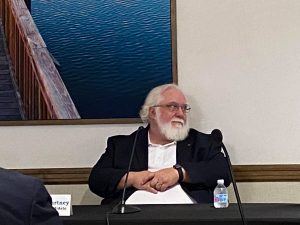
Democratic candidate Doug Courtney. ⓒ AskFlagler
In David Alfin’s mind, “that’s not a decision I make.” Alfin deferred to a potential Council vote on whether or not the policy would change, but vowed to adhere to the majority vote in Palm Coast’s survey in how he casted his own when the time comes.
Carol Bacha praised both Alfin and Manfre’s answers, and proposed a special section of residential streets designated for people’s commercial vehicles.
Doug Courtney was more averse to a relaxing of the policy: “this is my neighborhood, this is where we live.” He suggested it was preferable to see such vehicles on the side of a house than with a tarp covering it out front, and told voters “it’s gonna be very hard to convince me to allow something like that…I’m not for dump trucks and eighteen-wheelers in our swales and driveways.”
City Ethics Board?
In the final question given to the four mayoral hopefuls, they were asked how they’d avoid potential conflicts of interest, and whether they’d be open to creating an ethics board for the city.
Up first, David Alfin promised to have all city business discussion in the open at public meetings. “Holding up a high standard of ethics is essential to the City of Palm Coast,” Alfin said, before asserting that ethical responsibility fell individually upon each Council member and the Mayor.
“Ethics in my understanding…” Bacha said, “we have those things that are firm in the Ten Commandments, and we have those things that evolve.” She recalled taking an ethics course at Rollins College, and that ethics would evolve as the city grows.
Doug Courtney viewed an ethics board as a slippery slope, questioning whether an unelected board would have the power to supersede the City Council, and whether they could take judgment out of the Council’s hands in vetting and hiring staff candidates. It sounded like a good idea by itself, Courtney said, but presented the opportunity for a lot of problems.
Cornelia Manfre cited her job as a realtor having her take ethics courses every other year. “I believe that if I were to have a conflict, I would disclose,” Manfre said, addressing some voters’ concerns of having a realtor Mayor when development becomes an issue. She went further to promise she’d refrain from a vote if a potential conflict arose. If an employee acted unethically, Manfre posed ,it should be the City Manager and department head’s responsibilities to be the judge. She considered an ethics board a possibility, but maybe not a necessity.
Closing Remarks
In closing remarks, each candidate gave a final pitch for voters to choose them on July 27th.
David Alfin quoted Martin Luther King Jr, and called this the most important election in the history of Palm Coast. He promised to unify the Council, collaborate with those around him, and earn the community’s respect.
Carol Bacha thanked the crowd for their respectfulness, and for being “intensely seated” over the two hours. She urged the crowd to think about what unifies Palm Coast over recent divisions. She also took the free space to urge Palm Coast to use American Rescue Act funds allocated to the county to address water and sewer issues in the city.
Doug Courtney thanked the panel and audience, and wished he’d had five or ten minutes longer for each question. He encouraged the crowd to make sure they went out and voted.
Cornelia Manfre dropped a new campaign slogan on attendees: ‘Cornelia Cares’. She again touted her business background and history of volunteer work. Her closing promise was to lead the Council in a calm and professional manner, and promote the future integrity of the City of Palm Coast.
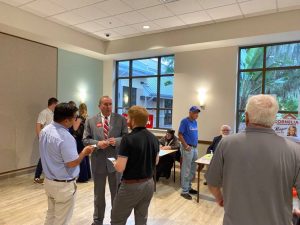
Candidates David Alfin, Carol Bacha, and Doug Courtney mingle with voters Wednesday night before the forum. ⓒ AskFlagler
Chris Gollon is a Flagler County resident since 2004, as well as a staple of the local independent music scene and avid observer of Central Florida politics, arts, and recreation.


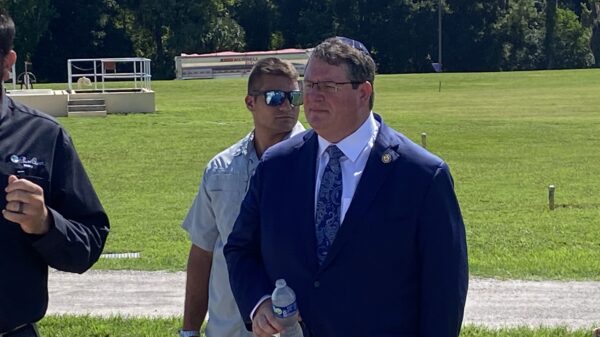
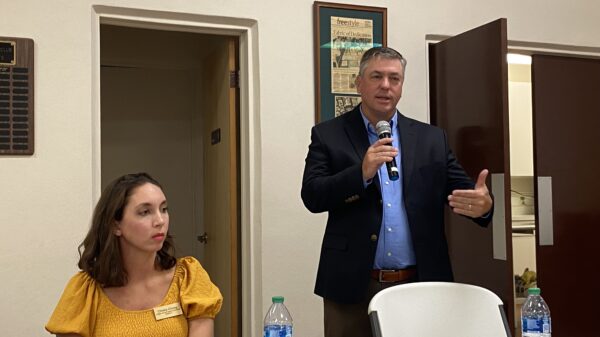
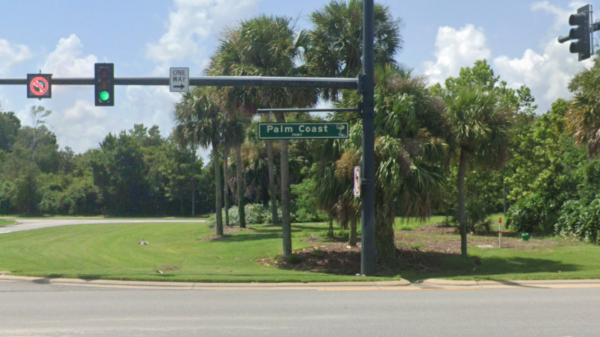

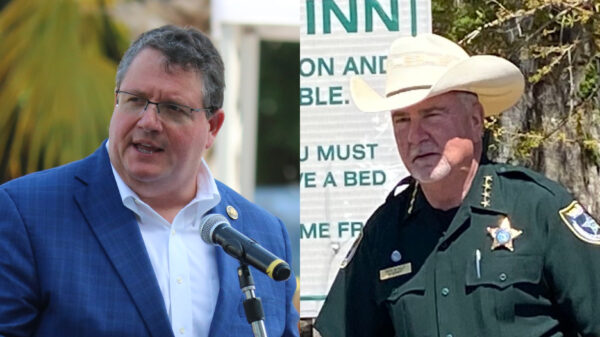


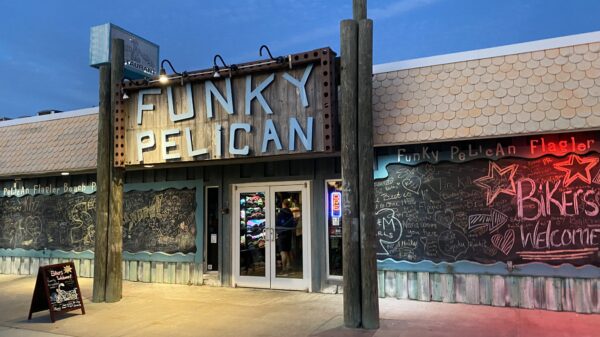






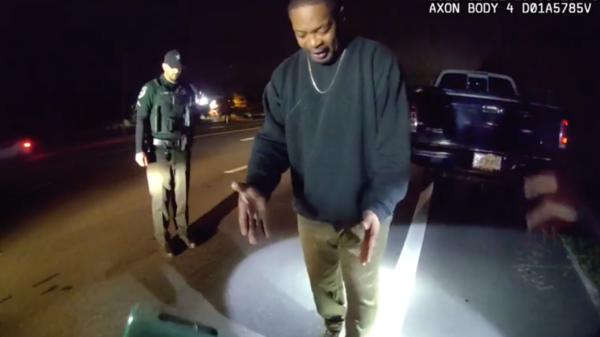

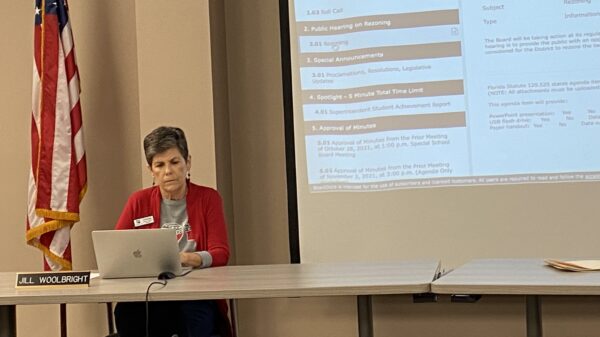

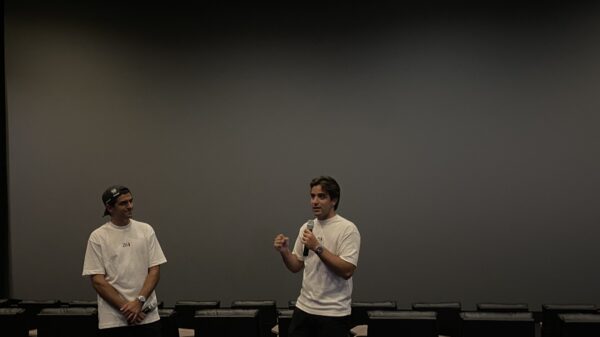
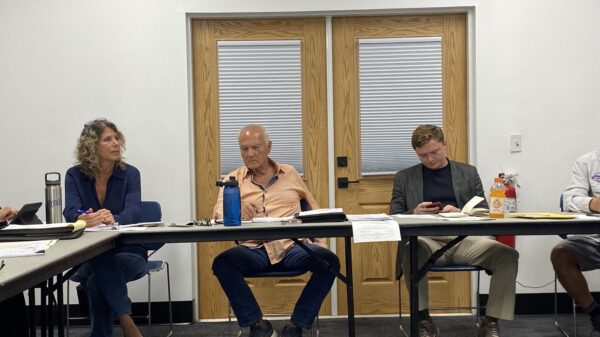
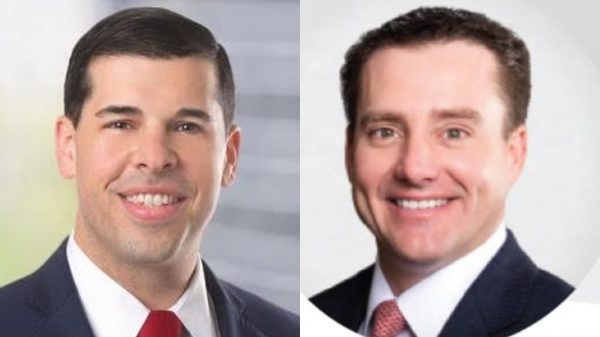





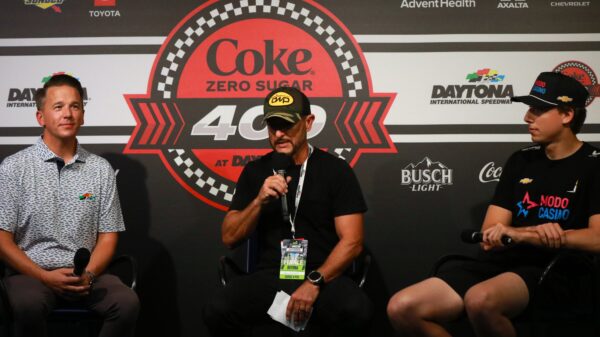

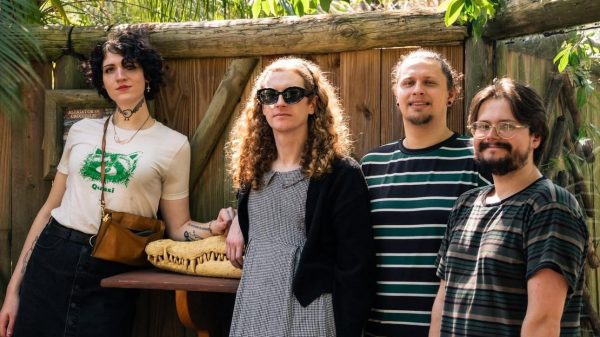
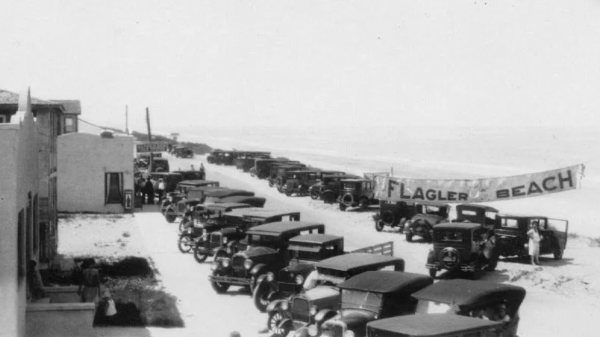
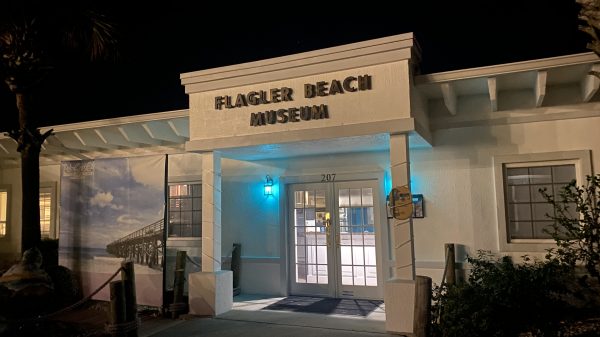
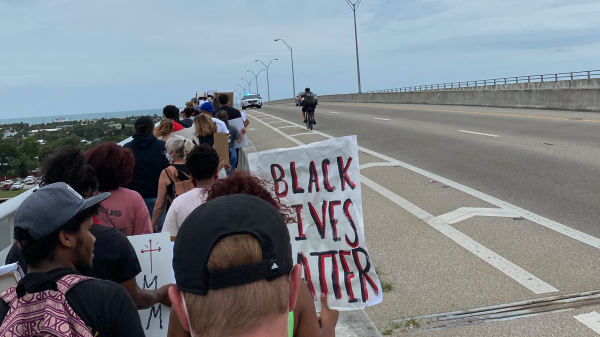
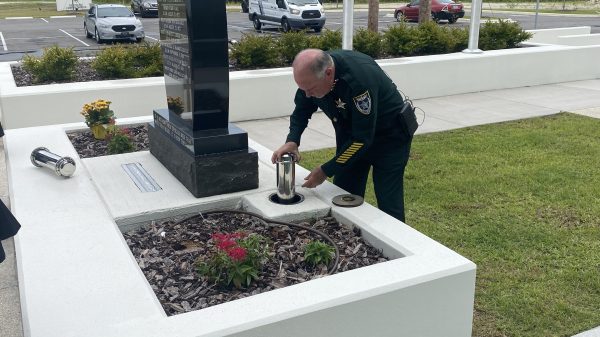
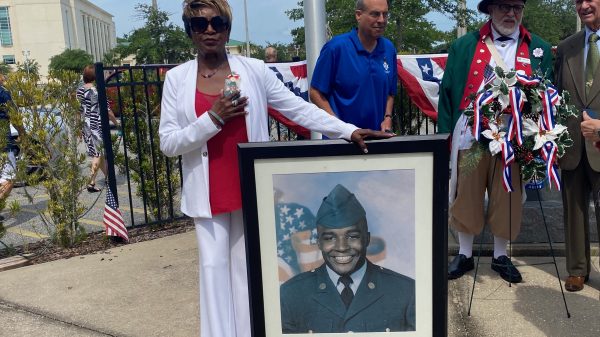
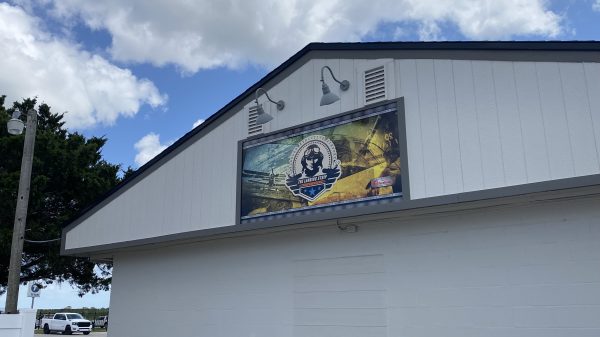


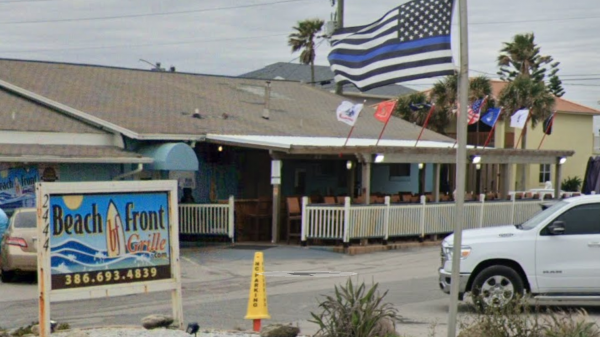
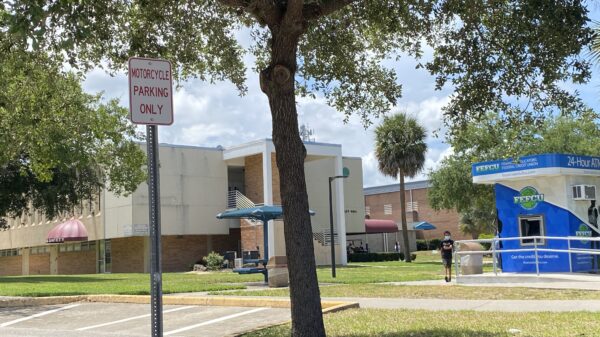
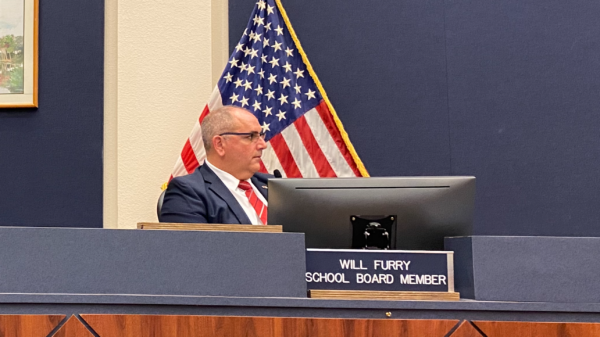





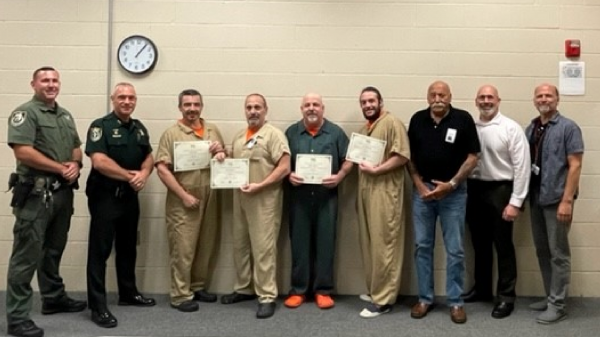
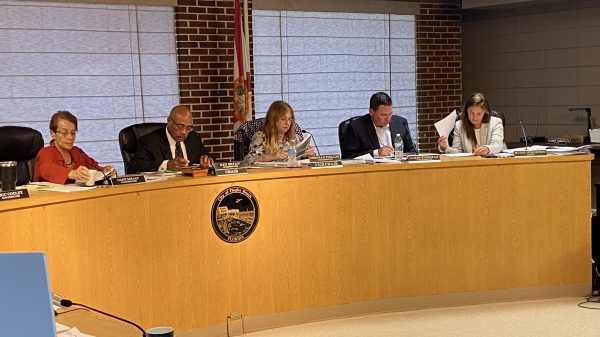

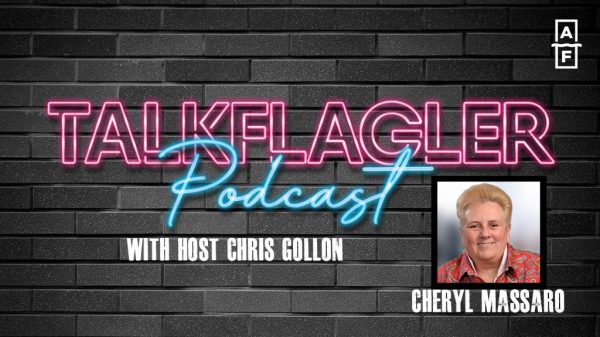



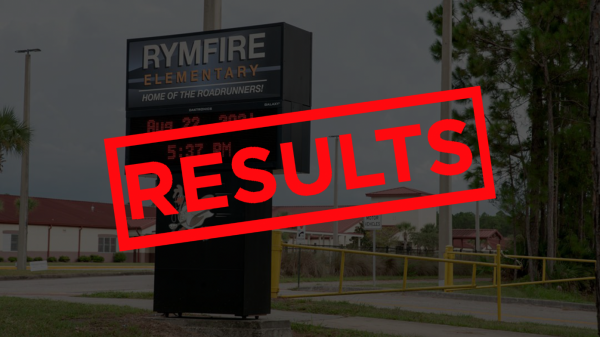
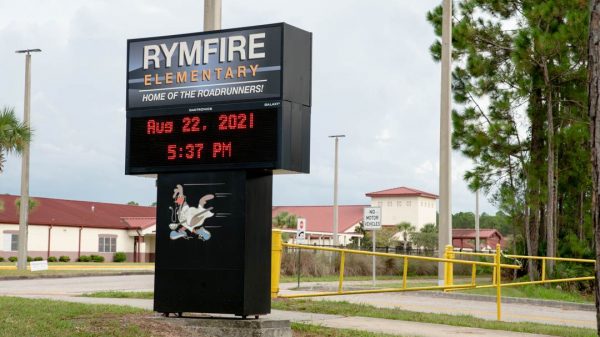
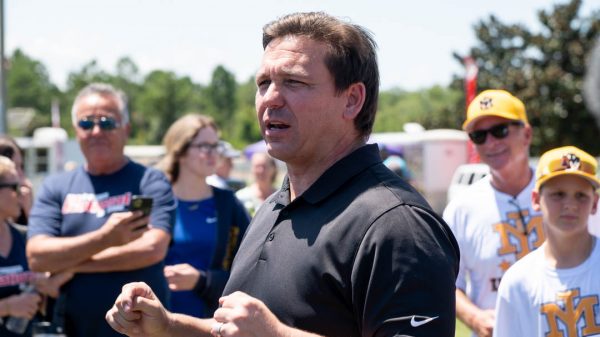
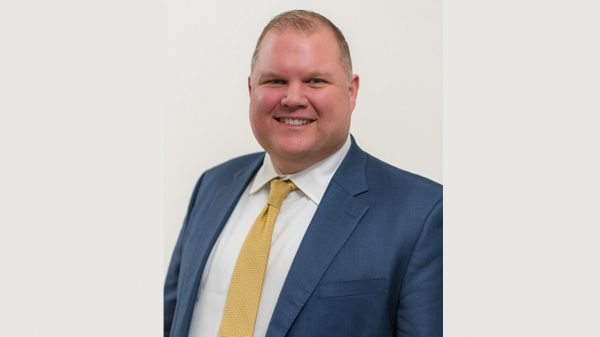

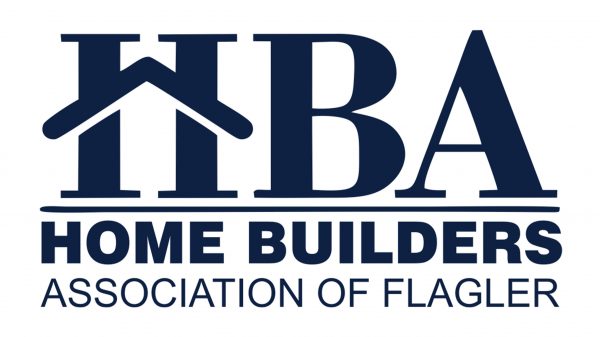
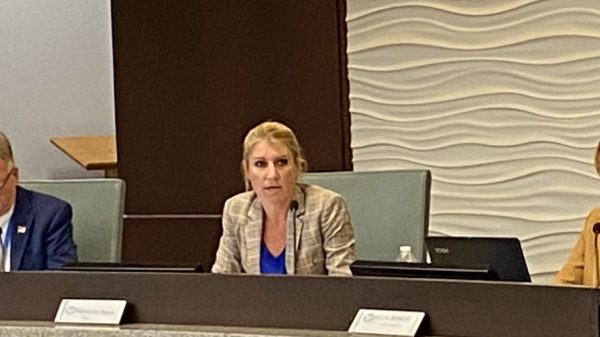


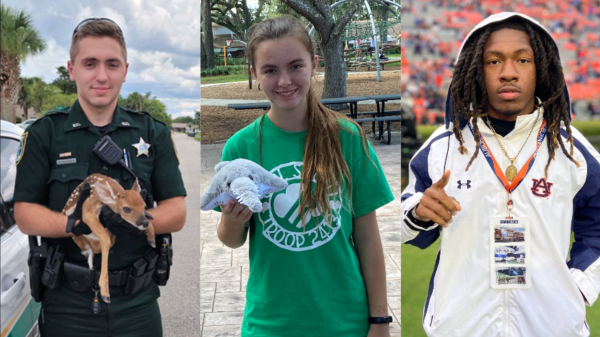

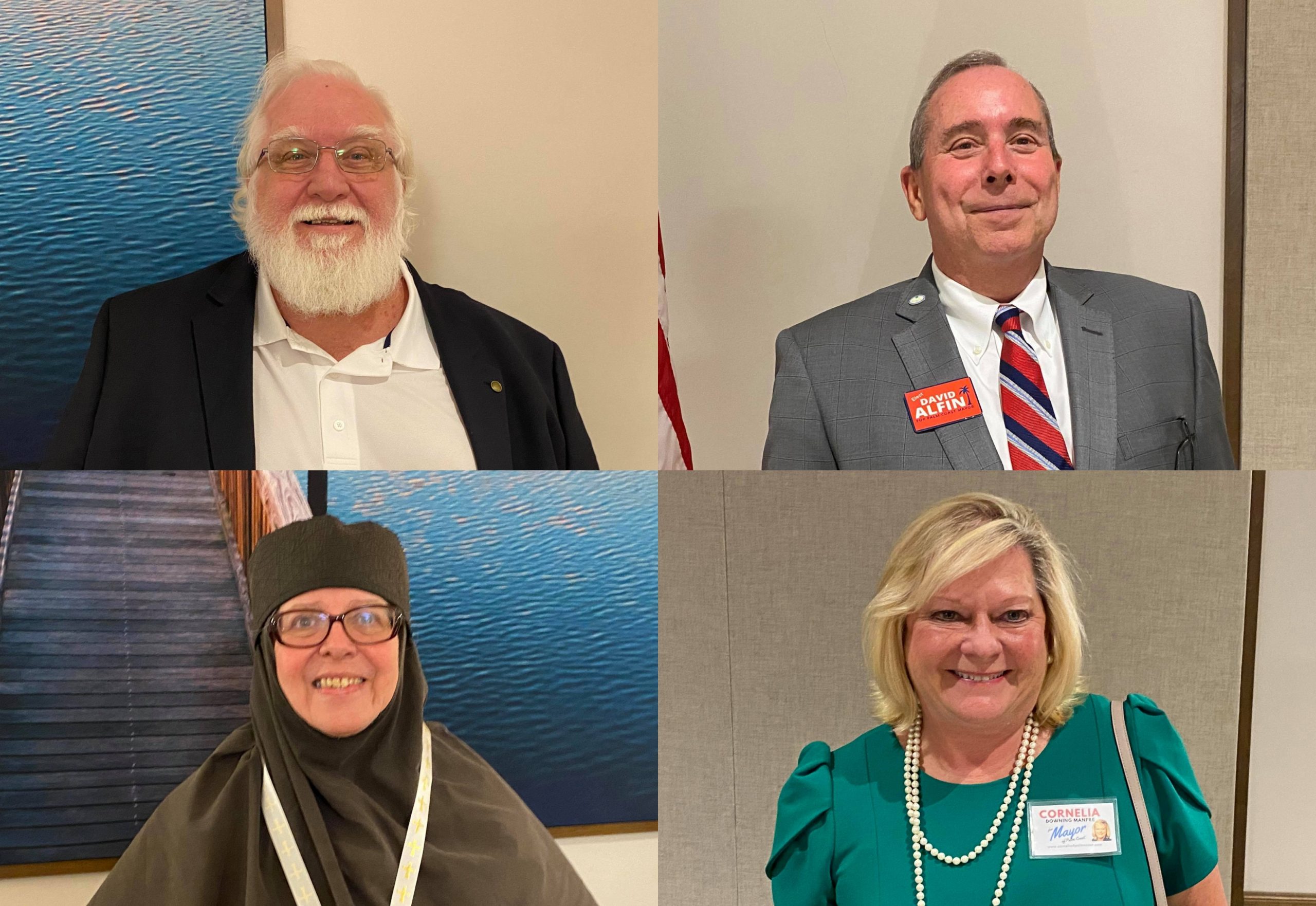
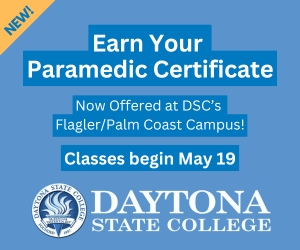

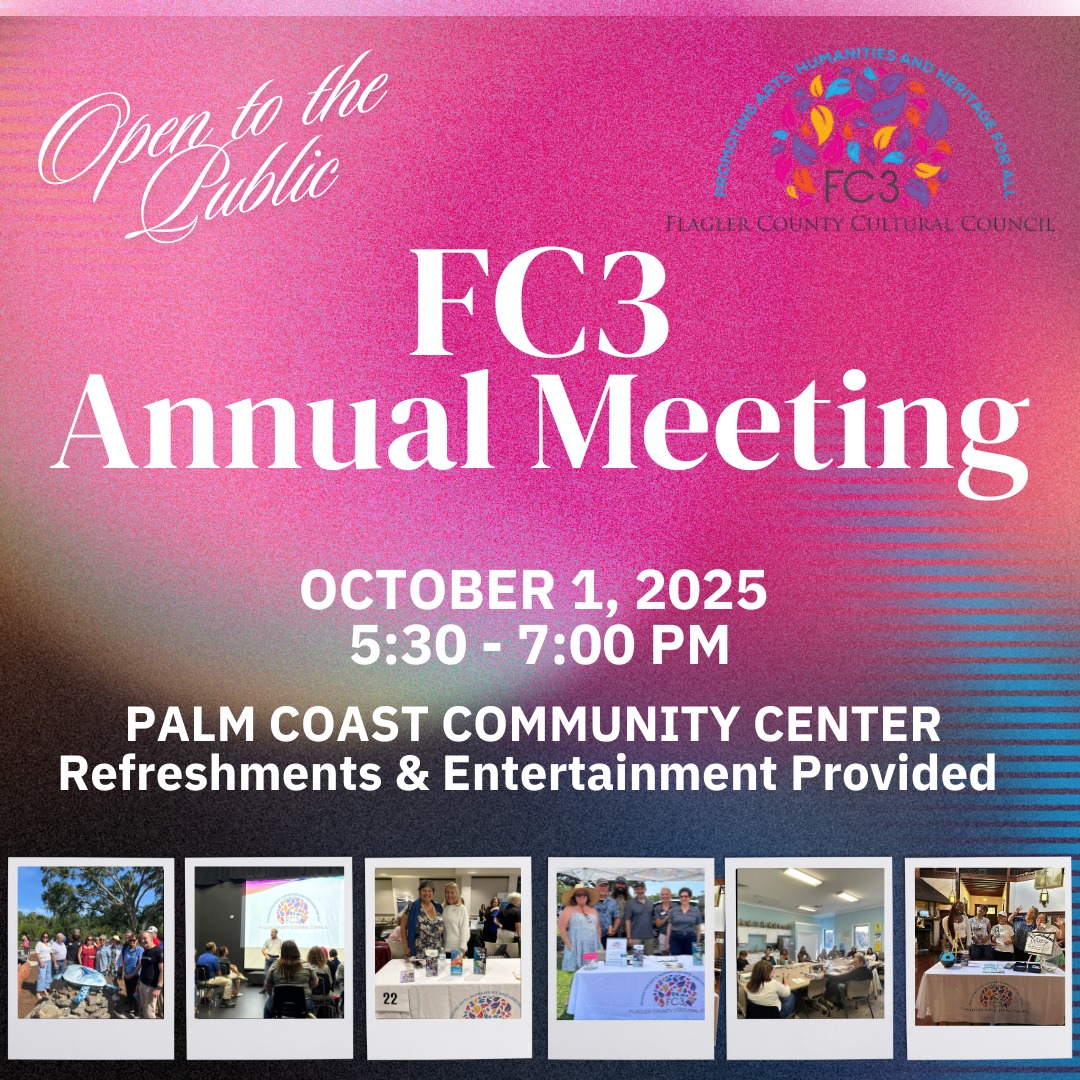
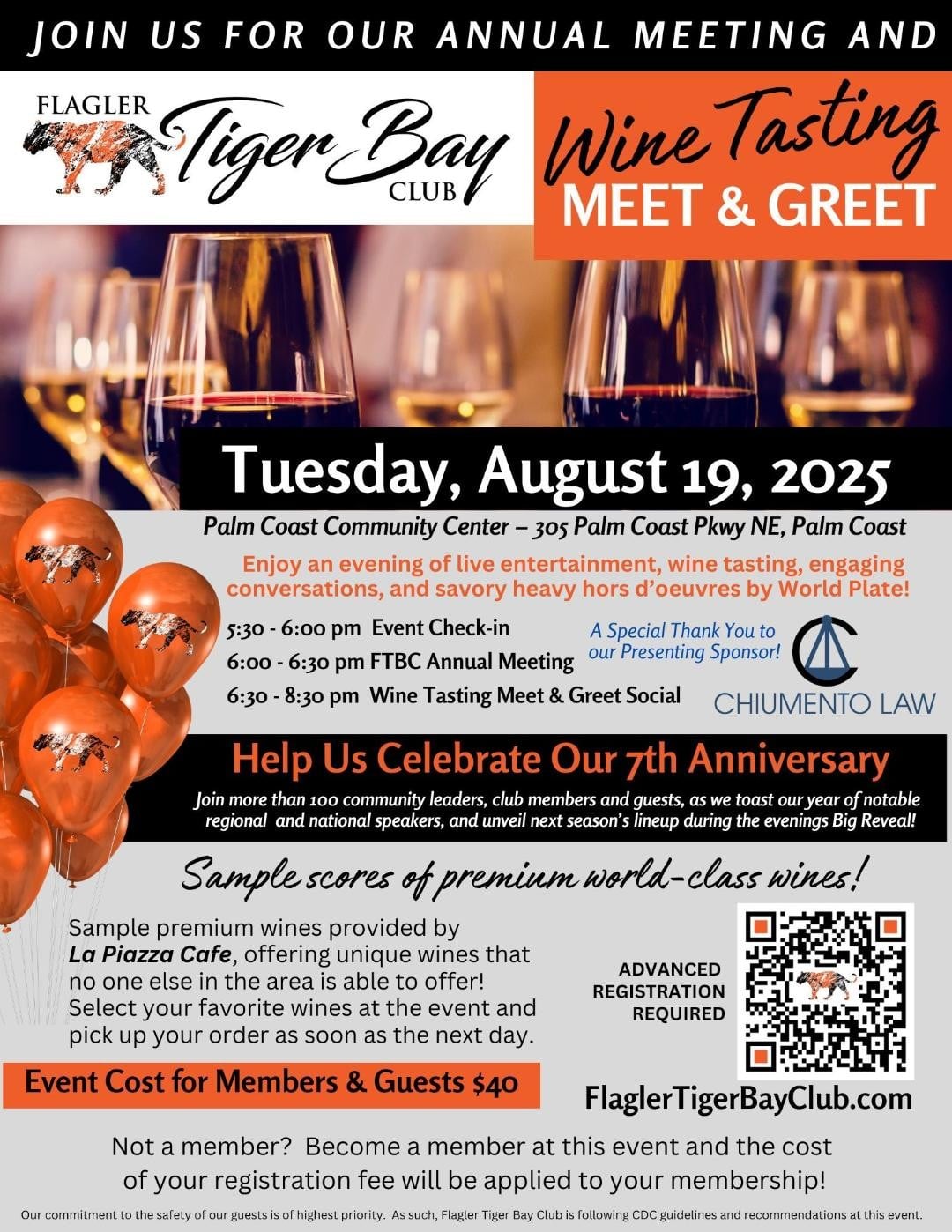



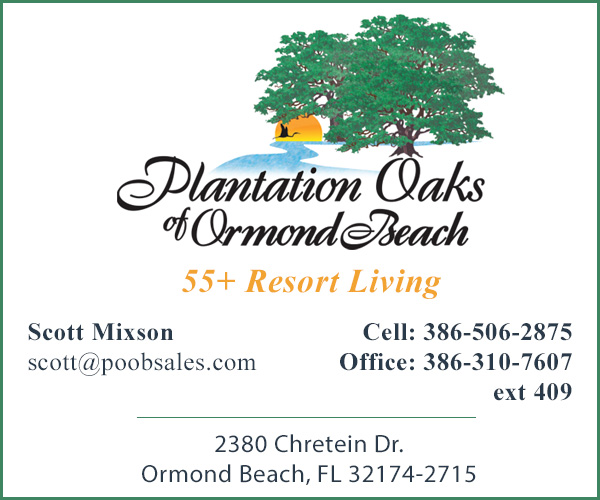



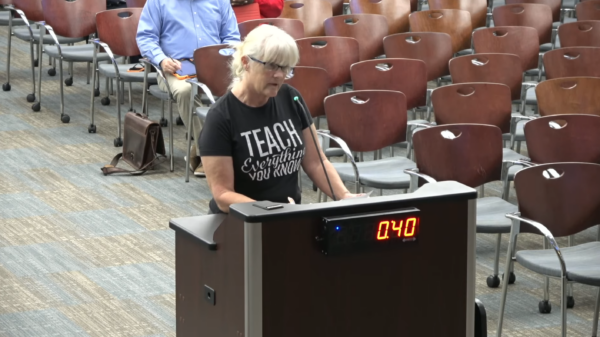
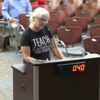
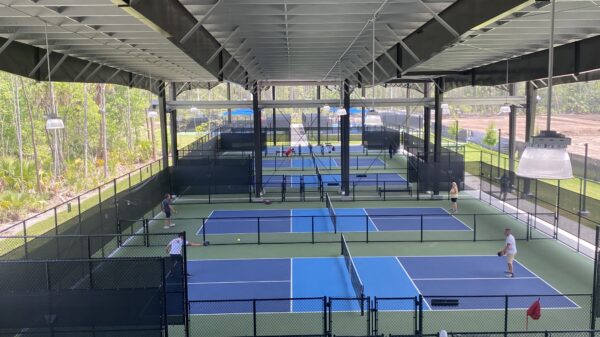

Grey Man
June 24, 2021 at 4:50 pm
The sign wavers for Alan Lowe stayed approx 2 hours. They simply moved to be visible to more traffic.
Concerned resident
June 25, 2021 at 4:18 am
I was disappointed in the fact there was many people including myself that this was held in a venue that clearly didn’t have enough parking as many of us left due to no parking. Then upon driving up the slimy looking characters pacing outside the front doors. From your photos it was the Lowe scum that was doing that (they didn’t have signs at the time). Next time put it somewhere that can accommodate more.
Grey Man
June 25, 2021 at 1:50 pm
interesting that you could identify people from that photo. One looks like a woman. Is she scum?
Nancy Boutot
June 29, 2021 at 7:49 am
I was not impressed by any of the responses regarding mental health. And it is not necessarily their fault, as it is swept under the rug so much that no one thinks or talks about it. It would be my hope that after this meeting, they took the time to research the issues so they have better responses next time. There needs to be increased funding for mental health programs for youth and adults. Mental Health America’s Back to School Toolkit – developed each year and released in mid-August (just around the corner) in anticipation of the start of the new school year – provides free resources, tools, tips, and information for parents, teachers, and youth on early identification of mental health issues. Do Flagler schools use this? Do the schools promote exercise, a proven stress reducer? Do we fund programs that pay for psychiatric hospitalization, inpatient or residential mental health treatment, outpatient mental health treatment, dual diagnosis treatment, psychotherapy, medication (for low to moderate income families), 12-step programs and support groups, and complementary and alternative treatments? Do we train the police how to handle individuals with significant mental illness? Do we have any adult career programs that use Individual Placement and Support, an employment service that helps more people with mental illness obtain employment than any other type of vocational program??? Would love to hear answers!!
PC Citizen
June 29, 2021 at 10:01 pm
Chris, before the PC Mayor candidate forum at the community center last week, Tiger Bay allowed residents to submit 3 questions for each of the candidates. I was under the assumption that all these questions would be asked and answered at the forum. Why weren’t they?
Chris Gollon
June 29, 2021 at 10:49 pm
I believe the explanation provided was that there were innumerably too many questions submitted to get them all in, but that the ten questions asked were tailored around frequent topics. Though ultimately, I’m not associated with Tiger Bay and don’t presume to speak for them.
Mary Meyers
June 30, 2021 at 8:12 pm
None of them is worth having, nothing good neither will do as none understands the basic role of government and everyone is ready to create this and that board to please anyone complaining. Useless, won’t improve a thing. I haven’t heard any practical things any of them will do.
With city council like that taxes will only go up with nothing to show for it.
It’s a pity only people that have poor understanding of things and too much time on their hands run for government.
Guess people worth having there are too busy running their businesses.